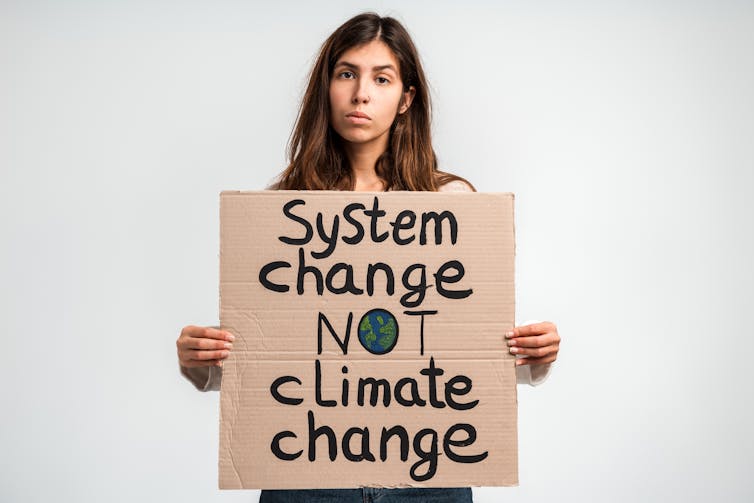
Climate professionals, people who work in roles which address climate change, are often criticised for what they eat or how they travel. Criticism of lifestyle choices by colleagues, family members or even strangers can be demotivating. Worse, it can hinder efforts towards building a sustainable future.
As more people start working in sustainability, both in traditional sectors such as climate researchers or public health professionals and within other workspaces where sustainability is embedded into an existing role, this type of criticism is in danger of becoming more familiar.
Climate change affects everyone, whether we like to admit it or not. It can be overwhelming to know how best to act on all the advice about living more sustainably. In fact, increased knowledge about what is necessary for a sustainable lifestyle can be paralysing, and prevent someone from taking action.
Of course, many of us do want to live more sustainably. But some people may feel restricted by the efforts and costs of taking these extra steps to change multiple aspects of our busy daily lives.
Get your news from actual experts, straight to your inbox. Sign up to our daily newsletter to receive all The Conversation UK’s latest coverage of news and research, from politics and business to the arts and sciences.
Instead of revamping our own lifestyles, it can be easier to challenge those recommending these changes to our behaviour, to see if they are following their own rules.
Climate professionals know which choices are best for the environment. But when you see one of them flying to a UN climate summit, drinking from a plastic water bottle or caught red-handed eating a beef burger, how do you feel? Confused? Vindicated? Perhaps, relief? If the very people who are advising us how to live sustainably aren’t practising what they preach, does this absolve us of responsibility to act?
Whether intentional or not, holding climate professionals to unrealistic standards is a tactic which delays effective climate action. It slows down climate action by redirecting responsibility and foregrounding low-impact solutions.
Calling out the failure of climate professionals can emphasise the difficulties of sustainable living and reinforce the idea that slowing down climate change is impossible. You may think that these imperfections are a reflection on their hypocrisy and limits the integrity of their work. In reality, it’s an indication that we are all people operating in a broken system, no matter our expertise.

Recent research from the World Resource Institute think tank into sustainable dietary, energy and transport choices stresses the importance of systemic change.
The report found that a system in which governments and businesses support and normalise sustainable behaviour would be far more effective than the weight of individuals taking action alone. And so, as a society, we need to value the work of those advocating for systems change, rather than scrutinising their lifestyle choices.
Ultimately, rich nations, wealthy people and fossil fuel companies are disproportionately to blame for climate change. However, their preferred narrative concerning the importance of individual action, rather than system change, prevails.
And this is nothing new. BP popularised the concept of a carbon footprint over 20 years ago. This displaced responsibility for environmental impact from large organisations and systems and towards citizens.
While people tend to view the impact of climate change as relevant to them, they may not be able to envisage a greener future. This is because people tend to focus on immediate effects rather than longer term outcomes. Short-term environmental policies can fuel this short-term thinking, preventing us from conceptualising a future that recovers from climate change.
Change from within the system
It’s easier to blame climate professionals for not sticking to their own advice, than to think about change at a higher level. But climate professionals must be part of the system to change the system, much to their frustration.
In fact, climate researchers like us actually fly more than researchers in other fields, because structural factors such as limited funding, accessibility of locations and professional pressures matter more than individual attitudes for reducing flights. How can we expect all the necessary voices to be at the table during international climate conferences if flying is the only feasible way for many to attend?
Some climate professionals do lead very impressive sustainable lifestyles. We should celebrate these efforts. But we need to dispel the expectation that all climate professionals have the resources to act the same within a broken system.
Read more: Quick climate dictionary: what actually is a carbon footprint?
Remember, climate professionals are working towards a system which empowers all citizens to choose these sustainable lifestyles, including their own. For instance, some researchers are studying the positive climate impact of protected cycle lanes, producing evidence in support of their construction in cities worldwide.
Imagine if public transport and active travel were the most obvious choice for everyone. If you wanted to drive, then you would have to meticulously plan a route incorporating private transport lanes, or be prepared to adapt if they don’t exist. Which would you choose?
Climate professionals are experiencing a whole spectrum of emotions related to climate change, including feeling stuck between what they say and what they do. Focusing on their personal behaviour risks discrediting and devaluing important climate-focused work.
This can detract from valuable conversations about the urgent need for wider systemic change. The next time you speak to a climate professional, try not to catch them out. Instead, ask about their work and its influence on changing the system – we guarantee they will be more receptive.
Don’t have time to read about climate change as much as you’d like?
Get a weekly roundup in your inbox instead. Every Wednesday, The Conversation’s environment editor writes Imagine, a short email that goes a little deeper into just one climate issue. Join the 45,000+ readers who’ve subscribed so far.
The authors do not work for, consult, own shares in or receive funding from any company or organisation that would benefit from this article, and have disclosed no relevant affiliations beyond their academic appointment.
This article was originally published on The Conversation. Read the original article.

.jpg?w=600)





